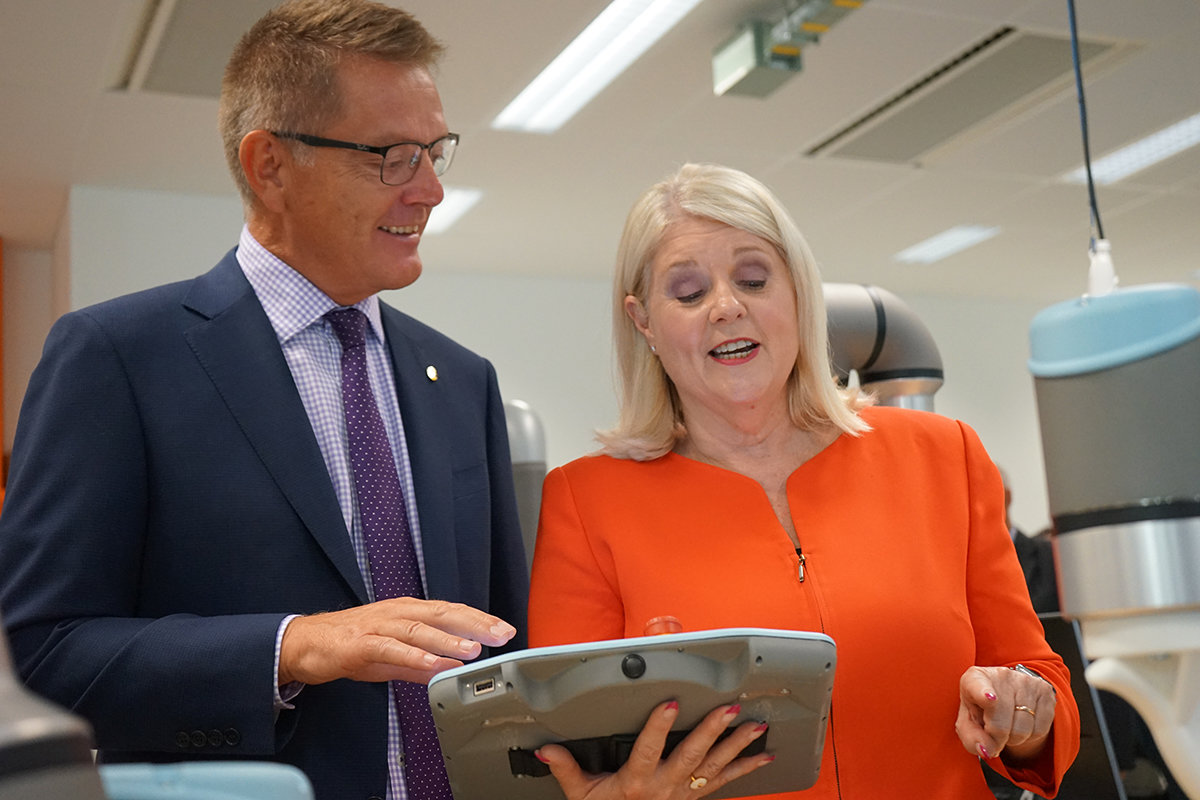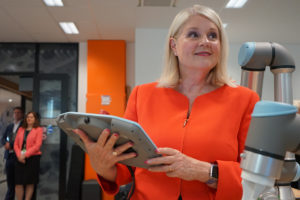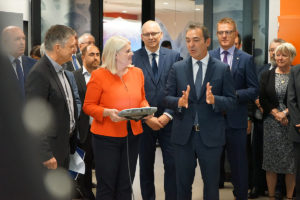
A $1.45 million grant from the Australian Government-funded , matched by industry funding, will help develop and pilot cutting-edge manufacturing technologies at Flinders University that will be used to build Australia’s nine Hunter Class frigates.
Launched at the Tonsley collaboration hub on February 18 by and l, the new technologies will be used by shipbuilding business, , to build the vessels for the at the world-class shipyard at Osborne in South Australia.

Minister Andrews says the $2.9 million investment will allow seven new researchers to join nine others working at the collaboration lab, bringing the total number of researchers to 16.
“The building of these frigates is a true project of the digital age and these new researchers will significantly increase the firepower of the research effort already underway at the collaboration lab. This project is an example of my determination to bring business and researchers together, to do things better and drive industry forward,” says Minister Andrews.
“The ideas and new practices developed as part of this research will not only benefit the frigates project but the Australian manufacturing sector in general.”
In partnership with Flinders University and local small and medium enterprises (SMEs), the project will drive digital transformation through advanced robotics, assistive manufacturing and readiness for Industry 4.0 utilisation – both inside the shipyard and more widely in the Australian supply chain.
Premier Steven Marshall says South Australia is now unquestionably the centre of defence and space, and the collaboration hub is a prime example of local expertise being used on a multi billion dollar project.
“We know that the technologies being developed at Tonsley are driving growth across high-tech industries, creating jobs and cementing our state as a national leader in defence and space, and the natural home of shipbuilding” said the Premier.
“South Australia is fast becoming a renowned leader in future industries and advanced manufacturing. We need to make sure the frigates will stay up to date with the latest in technology and that’s what will happen with this incredible collaboration between the ASC/BAE, Flinders University and the Innovative Manufacturing Cooperative Research Centre.”
Flinders University President and Vice-Chancellor Professor Colin Stirling says Flinders University’s research expertise in advanced manufacturing will help to ensure that the Hunter class frigates will be built by ASC Shipbuilding using world-leading technologies.
“Our strengths in industry 4.0 and cutting-edge digital laboratories will enable the development and testing of bespoke technologies to advance the specialised construction processes required for this nationally significant project.
“The IMCRC’s commitment recognises the value of the partnership that Flinders University has forged with ASC Shipbuilding and is further testament to the calibre of our researchers, our exceptional facilities and our leadership in innovation.”
BAE Systems Australia welcomed the funding from the IMCRC, which matches the company’s $1.45 million investment and is on top of the $5 million already invested in developing digital technologies, to turn the digital shipyard concept into reality.
From March 2020 until 2022 – when steel is cut on the first Hunter class frigate – the researchers will work with the shipbuilding workforce to trial advanced manufacturing technologies for application in the shipyard and beyond.

ASC Shipbuilding Managing Director, Craig Lockhart says the partnership with Flinders University will embrace a culture of innovation.
“Together we’re conducting research and developing emerging technologies in order to gain an insight into how shipyard workers will interact with digital technologies, and so we welcome the $1.45 funding from the IMCRC.
“Our employees will use these technologies alongside advanced manufacturing techniques to drive greater efficiency and increased productivity, enabling us to operate smarter and be more agile in our decision-making and responsive to our environment.
“An important aspect of the research at the collaboration hub is that we want to share the outcomes with industry, to help educate others on the importance and implementation of industry 4.0.”
IMCRC CEO and Managing Director, David Chuter, says digital technologies such as artificial intelligence, robotics, cognitive automation and advanced analytics are redefining the Australian manufacturing sector and therefore the nature of its work.
“Australian manufacturers, particularly small and medium enterprises (SMEs), need to learn how to embrace and contribute to new work environments that blend advanced technologies and digital skills with uniquely human skills.
“The project researches pathways to successfully adopt new technologies and develop human capabilities that – while focused on shipbuilding – can help Australian industry as a whole prepare for a future that is driven by digital transformation.”








